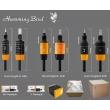The properly equipped tattoo studio will use biohazard containers for objects that have come into contact with blood or bodily fluids, sharps containers for old needles, and an autoclave for sterilizing tools.[30] Certain jurisdictions also require studios by law to have a sink in the work area supplied with both hot and cold water.
Proper hygiene requires a body modification artist to wash his or her hands before starting to prepare a client for the stencil, between clients, and at any other time where cross contamination can occur. The use of single use disposable gloves is also mandatory. Also, disposable gloves should be taken off after each stage of tattooing. The same gloves should be not be used to clean the tattoo station, tattoo the client, and cleaning the tattoo. The tattoo artist should be changing their disposable glove at each stage. In some states and countries it is illegal to tattoo a minor even with parental consent, and (except in the case of medical tattoos) it is usually not allowed to tattoo impaired persons, people with contraindicated skin conditions, those who are pregnant or nursing, those incapable of consent due to mental incapacity or those under the influence of alcohol or drugs.
Before the tattooing begins the client is asked to approve the final position of the applied stencil. After approval is given the artist will open new, sterile needle packages in front of the client, and always use new, sterile or sterile disposable instruments and supplies, and fresh ink for each session (loaded into disposable ink caps which are discarded after each client). Also, all areas which may be touched with contaminated gloves will be wrapped in clear plastic to prevent cross-contamination. Equipment that cannot be autoclaved (such as counter tops, machines, and furniture) will be wiped with an approved disinfectant.[31]
Membership in professional organizations, or certificates of appreciation/achievement, generally helps artists to be aware of the latest trends. However, many of the most notable tattooists do not belong to any association. While specific requirements to become a tattooist vary between jurisdictions, many mandate only formal training in bloodborne pathogens, and cross contamination. The local department of health regulates tattoo studios in many jurisdictions.
For example, according to the health departments in Oregon and Hawaii, tattoo artists in these states are required to take and pass a test ascertaining their knowledge of health and safety precautions, as well as the current state regulations. Performing a tattoo in Oregon state without a proper and current license or in an unlicensed facility is a felony offense.[32] Tattooing was legalized in New York City in 1997,[33] and in Massachusetts and Oklahoma between 2002 and 2006.








